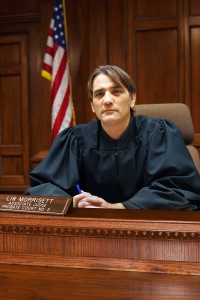The conclusions of the task force that was appointed in 2010 by the Texas Department of State Health Services were stark: The state’s mental healthcare system was “nearing or already over capacity” and “significant numbers of Texans are unable to access services for mental illnesses” for various reasons.
In the 19-page report, Stone recommended the “wholesale repeal and replacement” of the mental health code. She then moved on to work with the Hogg Foundation and Texas Appleseed,in leading the effort to actually design that overhaul.

Before her untimely death last year, she helped write the bills to put many of those reforms into effect. The bills had to take into account the competing interests of many groups, from law enforcement and mental health professionals to advocates for patients’ rights and family rights.
“She would have taken the whole [mental health code] to the shredder and started over, but there were too many people involved who knew the system,” said Stone’s husband, Dr. James Van Norman.
The package of bills was sponsored by two Democratic state senators, Royce West of Dallas and Zaffirini of Laredo, along with state representatives Elliott Naishtat, an Austin Democrat; Dallas County Republican Cindy Burkett; and Austin-area Republican Paul Workman. Probate judges, advocacy groups like Disability Rights Texas and Mental Health America, and many others also helped in the work.
One of the measures that passed and went into effect last September allows minors who are 16 and older to receive outpatient mental health treatment without parental permission. Another, by setting standard rules on forms used in mental health detentions, seeks to make sure that, as mental patients are transferred from one facility to another, information on their medical history and condition goes with them. A third — not part of the overall package — allows peace officers to confiscate firearms from detained individuals.
Other key changes failed to pass: Bills that would have allowed hospitals to detain people with “acute mental health emergencies” for four hours for medical evaluations and that would have set a higher bar for forced treatment. A requirement for patients’ attorneys to be present during court teleconference meetings, elimination of mental health warrants, and a waiver for court fees for private health clinics.
All of the bills embodying the Appleseed proposals passed the House and made it to the Senate floor. There, some were voted down; for others, time just ran out.
Stone “wasn’t fond of conflict and always looked for collaboration,” Van Norman said. “She was enough of a realist to get everyone at the table. She wasn’t naive and knew when politics came into play, but she never gave up.”
The failed bills underscored the decades-long differences among law enforcement, civil liberty, and family- rights groups on who the mental code should protect — and how.
“Getting these groups to agree can seem like herding cats sometimes,” said Travis County Probate Judge Guy Herman.
********
Law enforcement officials didn’t want to lose the provisions in the mental health code allowing them to detain individuals whose mental problems threaten themselves or others. But patients’-rights advocates argued that forced treatments are unproductive in many cases. Family-rights advocates, on the other hand, say they need some way to mandate treatment for relatives who refuse to seek help voluntarily.

Changing the rules on conditions under which courts can order psychiatric treatment was one of the more contentious debates in putting together the legislative package — and a proposed change in that standard was one of the items that didn’t pass. In retrospect, that outcome may not be surprising, considering that leaders of two of the most active advocacy groups –– Texas Appleseed and Mental Health America of Texas –– could not agree on what a new standard should be.
Discord among the major players also sank a proposal to end the use of mental health warrants. The proposal apparently wouldn’t have kept judges and police officers from bringing people in for emergency psychiatric detention, but it would have changed the way some counties now handle those detentions.
In some counties, including Tarrant, probate judges now routinely issue mental health warrants to detain and involuntarily admit patients to local clinics. Other counties don’t use the specialized warrants at all.
Texas Appleseed officials said that, where mental health warrants are used, law enforcement officers have to go through extra steps in order to take detainees to a mental health facility rather than to jail. In Travis and other counties, judges have no such requirements, creating an inconsistency that Appleseed leaders said needs to be addressed.
Tarrant County Associate Probate Judge Lin Morrisett said he doesn’t understand why Travis County doesn’t use mental health warrants. “There are a lot of dangerous people. In Tarrant County, we have specialized officers who pick up people on detention warrants. They know what to look for. I don’t understand how this non-warrant world would work. What I don’t want to do is shut the system down.”
Fort Worth Probate Court Judge Patrick Ferchill said that mental health warrants are important and that his court opposes any “one-size-fits-all Austin-based revision.”
Herman, however, said he is “fully in favor of getting rid of these warrants.”
In Travis County, he said, “We haven’t issued a mental health warrant since 1983. The criteria are exactly the same for detaining mentally ill people with warrants as without warrants. An officer can pick up a person without a warrant if the officer sees the individual is mentally ill and he is likely to cause serious harm to himself or others.”
********
Fort Worth resident Charles Schlaepfer says a jail diversion program helped him turn his life around.
The combination of his bipolar disorder and use of illegal drugs nearly made him into another statistic in 2008, but Tarrant County Criminal Court Judge Brent Carr gave him a second chance. Instead of risking incarceration on drug possession and evidence-tampering charges, Schlaepfer agreed to an 18-month program of counseling, meetings, and volunteer work, which he successfully completed.

Schlaepfer said the program not only kept him out of jail but also out of hospital psychiatric wards — something he never wanted to experience again. The diversion program “is unlike any other facet of the criminal justice system I’ve seen,” he said.
After completing the program, his charges were expunged, and he now has a clean slate going forward. He had earned certifications in accounting and as a peer specialist to counsel others. His interests are moving toward computer science, but he feels his work at Hope Concept Wellness Center is where he belongs for now.
One of the new laws that went into effect in January will increase the availability of jail diversion programs. The legislation requires all state-run community health clinics to incorporate jail diversion programs to “reduce the involvement of the criminal justice system in managing adults with [certain] disorders.”
Mitchell, of Disability Rights, said Texas was in need of a way to keep mentally ill persons out of jail. In 2007, she said, there were 400 inmates waiting for treatment to improve their mental conditions sufficiently so that they could legally be tried.
“These people were deteriorating in jail,” she said. “They were waiting for years to be treated sometimes. We filed a lawsuit and set a 21-day maximum wait before treatment.” The 21-day maximum is now a requirement for Texas courts.
A Medicaid waiver approved in 2011 is also helping create more jail diversion programs. Stacy Wilson, associate general counsel of the Texas Hospital Association, said the waiver had provided about $2 billion over five years for behavioral and mental health programs. Some of those projects are jail diversion efforts created by county MHMR agencies.
Other keep-’em-out-of-jail efforts being underwritten by the Medicaid funds include a program in Round Rock to assess recent arrestees and parolees to determine if they are suffering from mental disorders and, if they are, to find care for them. And a $7 million program in Edinburg is creating a law enforcement task force with the objective of cutting down on “preventable” admissions and readmissions of the mentally ill into the criminal justice system.
Carlton said MHMR of Tarrant County received waiver funding for six new projects. The money will allow the agency to keep its clinics open longer, offer new services at its clinic on Lancaster Avenue, add eight beds for patients going through drug detoxification, and add peer support services, registered nurse case management, and crisis stabilization for people with intellectual and developmental disabilities.
Between Granbury Road and the Chisholm Trail Parkway in southwest Fort Worth is a new 72-bed community mental health clinic. The facility, Mesa Springs, has separate areas for intensive outpatient programs, geriatric care, and long-term inpatient care and drug rehabilitation.
Mesa Springs medical director Stewart Keller said the Affordable Care Act requires insurers to provide mental health coverage and that the Medicaid waiver is expanding resources for people who seek mental health treatment.
Mark Karaffa, development director at the clinic, said Mesa Springs “will be adding services at a time when local health clinics are overcrowded. JPS hospital has to send 30 to 40 patients a week to other clinics due to lack of space.”
********












Edward, thank you for highlighting the challenges that Texas faces in mental health and in substance use; and for the successes we have made; and for spotlighting some of our champions. I especially thank you for the human dimension of your article. Let us all continue to advance recovery and wellness in Texas. Sincerely, Dr. M
What outcomes are the state’s mental health providers fostering? Do individuals who can access treatment obtain that care which makes a difference?
Joe. Good questions. There are still problems about ease and quality of access. There are more resources going into teleconferencing technology that will allow psychiatrists to assist people in remote parts of the state, a long-time problem. There appears to be more emphasis on peer-to-peer counseling and a new philosophical approach that emphasizes recovery (learning to live with symptoms) over being cured. I was also impressed to see efforts to reach children and give public school teachers mental “first aid” training.
Edward, excellent article.
This was a really excellent article about some of the mental health challenges in Texas. I’m a psych student, and I’ve found it shocking that in Texas, the prison system because the avenue of treatment for many with mental illness because of lack of resources and legislative support in Texas. This is a good start, but we should only see this as a beginning, the system is still severely broken and needs help.
Sir,
my deepest sympathies to you, your wife & any one else touched by such a tragic loss. Mental health is a complex area, but certainly not resolved in a prison environment.
If there is anything I am able to help you with please contact me on Linked-in.
Maurice Dutton
Safety Consultant
Trainer & Assessor
Cairns Australia